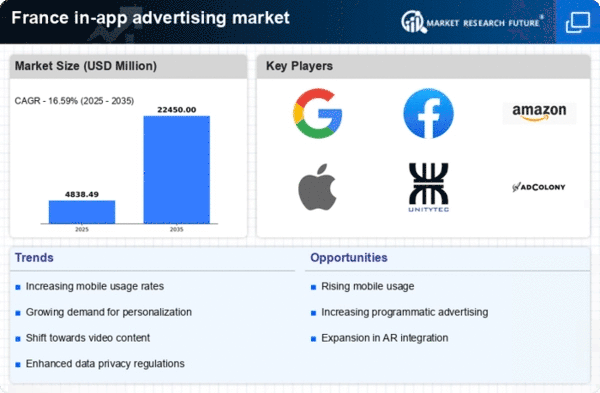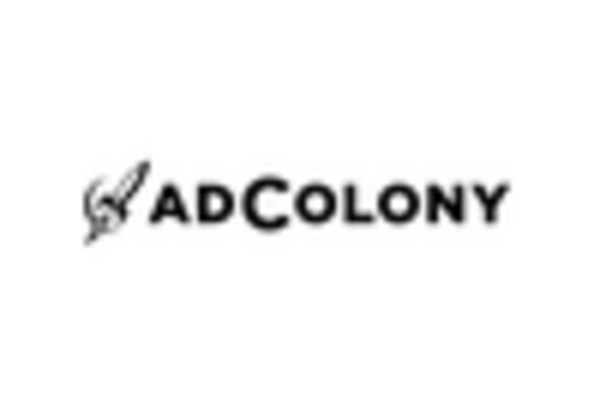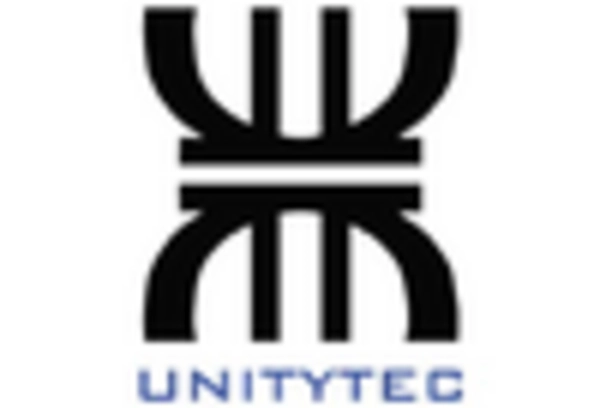Growing E-commerce Integration
The integration of e-commerce within mobile applications is significantly impacting the in app-advertising market in France. As online shopping continues to gain traction, brands are increasingly utilizing in-app ads to drive sales directly through their applications. In 2025, it is projected that e-commerce sales in France will reach €120 billion, with a substantial portion attributed to mobile transactions. This trend encourages advertisers to create seamless shopping experiences through in-app advertising, thereby enhancing user engagement and conversion rates. The in app-advertising market is thus evolving to accommodate this shift, with a focus on creating interactive and shoppable ad formats that cater to the growing e-commerce landscape.
Emergence of Augmented Reality Ads
The in app-advertising market in France is witnessing the emergence of augmented reality (AR) ads, which offer immersive experiences for users. As technology advances, brands are increasingly adopting AR to create engaging advertisements that allow users to interact with products in a virtual environment. This innovative approach not only captures user attention but also enhances brand recall. In 2025, it is estimated that AR advertising will account for approximately 15% of the total in app-advertising market in France. This trend suggests a shift towards more experiential marketing strategies, as advertisers seek to differentiate themselves in a competitive landscape.
Increased Mobile Device Penetration
The in app-advertising market in France is experiencing a notable surge due to the increased penetration of mobile devices. As of November 2025, approximately 85% of the French population owns a smartphone, which facilitates greater access to mobile applications. This widespread adoption enables advertisers to reach a larger audience through targeted in-app ads. Moreover, the average time spent on mobile devices has risen to about 3.5 hours daily, indicating a significant opportunity for brands to engage users effectively. The in app-advertising market is thus poised for growth as advertisers capitalize on this trend, tailoring their strategies to leverage the high engagement levels associated with mobile applications.
Shift Towards Data-Driven Marketing
The in app-advertising market in France is increasingly influenced by the shift towards data-driven marketing strategies. Advertisers are now utilizing advanced analytics and machine learning to optimize their campaigns, leading to more personalized ad experiences for users. In 2025, it is estimated that around 70% of marketers in France are employing data analytics to inform their advertising decisions. This trend not only enhances the effectiveness of ad placements but also improves return on investment (ROI) for advertisers. Consequently, the in app-advertising market is likely to see a rise in demand for sophisticated tools and platforms that facilitate data analysis and campaign management.
Regulatory Changes Impacting Advertising Practices
The in app-advertising market in France is currently navigating a landscape shaped by regulatory changes that impact advertising practices. New regulations aimed at enhancing user privacy and data protection are influencing how advertisers approach their campaigns. As of November 2025, compliance with these regulations is paramount, with many companies investing in transparent data practices. This shift may lead to a more ethical advertising environment, but it also poses challenges for targeting and personalization. The in app-advertising market must adapt to these changes, potentially leading to innovative solutions that balance user privacy with effective advertising strategies.
















